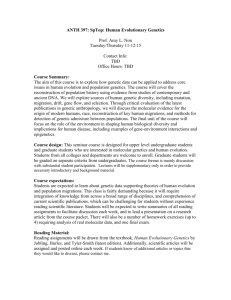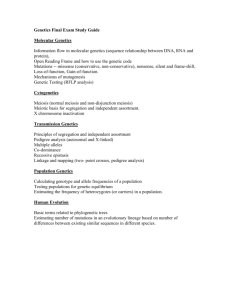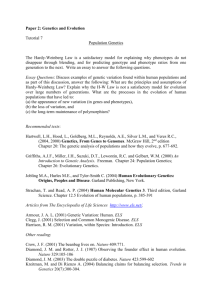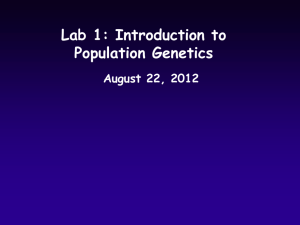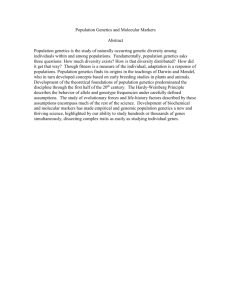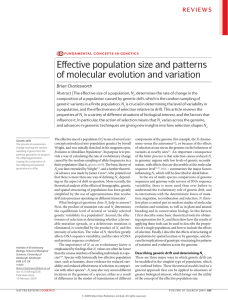SYLLABUS BI515: Population Genetics Fall 2014
advertisement
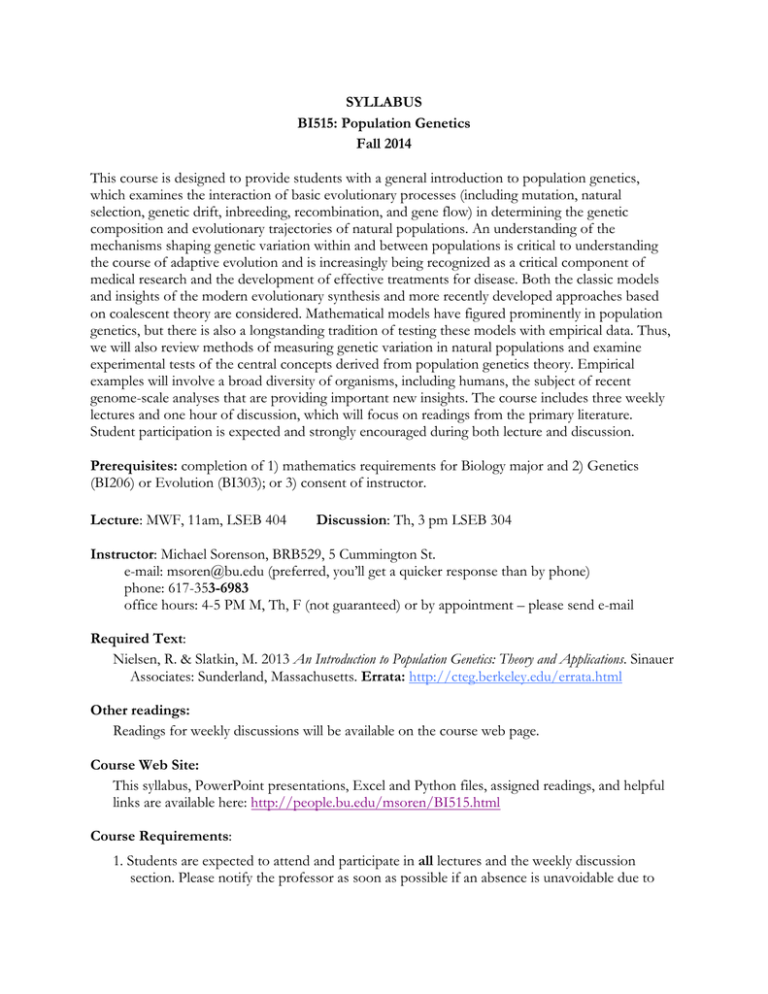
SYLLABUS BI515: Population Genetics Fall 2014 This course is designed to provide students with a general introduction to population genetics, which examines the interaction of basic evolutionary processes (including mutation, natural selection, genetic drift, inbreeding, recombination, and gene flow) in determining the genetic composition and evolutionary trajectories of natural populations. An understanding of the mechanisms shaping genetic variation within and between populations is critical to understanding the course of adaptive evolution and is increasingly being recognized as a critical component of medical research and the development of effective treatments for disease. Both the classic models and insights of the modern evolutionary synthesis and more recently developed approaches based on coalescent theory are considered. Mathematical models have figured prominently in population genetics, but there is also a longstanding tradition of testing these models with empirical data. Thus, we will also review methods of measuring genetic variation in natural populations and examine experimental tests of the central concepts derived from population genetics theory. Empirical examples will involve a broad diversity of organisms, including humans, the subject of recent genome-scale analyses that are providing important new insights. The course includes three weekly lectures and one hour of discussion, which will focus on readings from the primary literature. Student participation is expected and strongly encouraged during both lecture and discussion. Prerequisites: completion of 1) mathematics requirements for Biology major and 2) Genetics (BI206) or Evolution (BI303); or 3) consent of instructor. Lecture: MWF, 11am, LSEB 404 Discussion: Th, 3 pm LSEB 304 Instructor: Michael Sorenson, BRB529, 5 Cummington St. e-mail: msoren@bu.edu (preferred, you’ll get a quicker response than by phone) phone: 617-353-6983 office hours: 4-5 PM M, Th, F (not guaranteed) or by appointment – please send e-mail Required Text: Nielsen, R. & Slatkin, M. 2013 An Introduction to Population Genetics: Theory and Applications. Sinauer Associates: Sunderland, Massachusetts. Errata: http://cteg.berkeley.edu/errata.html Other readings: Readings for weekly discussions will be available on the course web page. Course Web Site: This syllabus, PowerPoint presentations, Excel and Python files, assigned readings, and helpful links are available here: http://people.bu.edu/msoren/BI515.html Course Requirements: 1. Students are expected to attend and participate in all lectures and the weekly discussion section. Please notify the professor as soon as possible if an absence is unavoidable due to illness or other circumstances. Unexplained absences will result in a reduced grade for class participation. 2. Participate in weekly discussion section. Papers for discussion will be available on the course web page. These papers should be read PRIOR to the discussion section. All students should come to discussion prepared with written questions and/or comments on each paper. 3. Read the NY Times Science Section and other online media and tell the professor and/or class about interesting new stories/research involving population genetics 4. Complete problem sets and programming “projects” as assigned. Collaborative work is encouraged, but each student is responsible for gaining a clear understanding of how to solve each problem. 5. Two mid-term exams during the scheduled lecture hour (3 October, 7 November) and one final exam (date and time TBA) 6. Students are responsible for knowing, understanding, and adhering to the provisions of the CAS Academic Conduct Code (copies are available in room CAS 105 or online at: http://ww.bu.edu/cas/academics/programs/conductcode.html). Cases of suspected academic misconduct will be referred to the Dean’s Office. Grading: Class participation Assignments Exams (15%, 15%, 25%) 20% 25% 55% (2 x mid-term exams, final exam) Lecture & Discussion Schedule in Progress… Lecture Schedule Week 1 3-Sept Preliminaries 5-Sept Phenotypic & Genetic Variation in Natural Populations; Single Locus (Mendelian) versus Multilocus (quantitative) Inheritance N&S: pp. 1-4 Discussion Schedule 11 September – Genetic Polymorphisms and HW-Equilibrium Kreitman M (1983) Nucleotide polymorphism at the alcohol-dehydrogenase locus of Drosophila melanogaster. Nature 304, 412-417. Hishimoto A, Fukutake M, Mouri K, Nagasaki Y, Asano M, Ueno Y, Nishiguchi N, Shirakawa O (2010) Alcohol and aldehyde dehydrogenase polymorphisms and risk for suicide: a preliminary observation in the Japanese male population. Genes, Brain and Behavior 9, 498-502.
